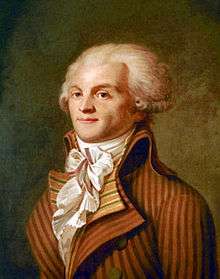
Men of all countries are brothers, and the different peoples should help one another to the best of their ability, like citizens of the same state.
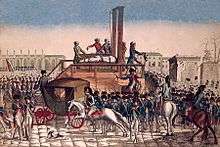
I utter this deadly truth with regret, but Louis must die, because the homeland has to live.
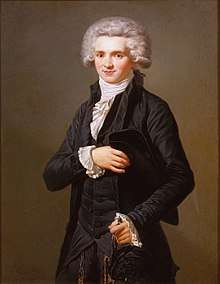
The most extravagant idea that can be born in the head of a political thinker is to believe that it suffices for people to enter, weapons in hand, among a foreign people and expect to have its laws and constitution embraced. No one loves armed missionaries...
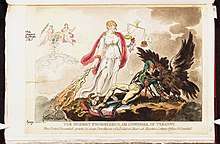
No one loves armed missionaries; the first lesson of nature and prudence is to repulse them as enemies.
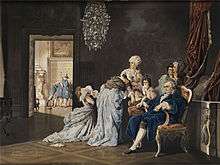
If the rich...regarded themselves as... brothers to the poor, it might be possible to recognize no law but the most unlimited freedom; but if it is true that avarice can speculate on the misery and tyranny itself on the despair of the people... then why should not the law repress these abuses?
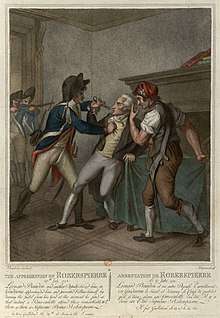
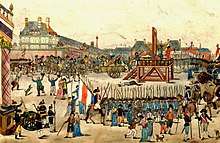
Death is the commencement of immortality.

Happily virtue is natural in the people, [despite] aristocratical prejudices. A nation is truly corrupt, when, after having, by degrees lost its character and liberty, it slides from democracy into aristocracy or monarchy; this is the death of the political body by decrepitude...
Maximilien François Marie Isidore de Robespierre (6 May 1758 – 28 July 1794) was one of the leaders of the French Revolution. Also known as "the Incorruptible". He was an influential member of the Committee of Public Safety and was instrumental in the period of the Revolution commonly known as the Reign of Terror that ended with his arrest and execution.

We want, in a word, to fulfil nature’s wishes, to further the destinies of humanity, to keep the promises of philosophy, to absolve providence of the long reign of crime and tyranny. So that France...may become the model for all nations, the terror of oppressors, the consolation of the oppressed... That is our ambition, that is our goal.

To punish the oppressors of humanity is clemency; to forgive them is cruelty... Therefore let him beware who should dare to influence the people by that terror which is made only for their enemies!...Death to the villain who dares abuse the sacred name of liberty or the powerful arms intended for her defense, to carry mourning or death to the patriotic heart...
Quotes
- The People is always worth more than individuals.
- As quoted in Portrayals of Revolution, Images, Debates, and Patterns of Thought on the French Revolution, p. 27, by Noel Parker, Southern Illinois University Press
- Every citizen fulfilling the conditions of eligibility that you have prescribed has the right to public office.
- "On Voting Rights for Actors and Jews" (21 December 1789)
- Things have been said to you about the Jews that are infinitely exaggerated and often contrary to history. How can the persecutions they have suffered at the hands of different peoples be held against them? These on the contrary are national crimes that we ought to expiate, by granting them imprescriptible human rights of which no human power could despoil them. Faults are still imputed to them, prejudices, exaggerated by the sectarian spirit and by interests. But to what can we really impute them but our own injustices? After having excluded them from all honours, even the right to public esteem, we have left them with nothing but the objects of lucrative speculation. Let us deliver them to happiness, to the homeland, to virtue, by granting them the dignity of men and citizens; let us hope that it can never be policy, whatever people say, to condemn to degradation and oppression a multitude of men who live among us. How could the social interest be based on violation of the eternal principles of justice and reason that are the foundations of every human society?
- "On Voting Rights for Actors and Jews" (21 December 1789)
- It is indeed a great interest, the conservation of your colonies, but even that interest is connected with your constitution; and the supreme interest of the nation and of the colonies themselves is that you conserve your liberty and do not overturn the foundations of that liberty with your own hands. Faugh! Perish your colonies, if you are keeping them at that price. Yes, if you had either to lose your colonies, or to lose your happiness, your glory, your liberty, I would repeat: perish your colonies.
- "On the Condition of Free Men of Colour" (31 May 1791)
- La plus extravagante idée qui puisse naître dans la tête d'un politique est de croire qu'il suffise à un peuple d'entrer à main armée chez un peuple étranger, pour lui faire adopter ses lois et sa constitution. Personne n'aime les missionnaires armés; et le premier conseil que donnent la nature et la prudence, c'est de les repousser comme des ennemis.
- The most extravagant idea that can be born in the head of a political thinker is to believe that it suffices for people to enter, weapons in hand, among a foreign people and expect to have its laws and constitution embraced. No one loves armed missionaries; the first lesson of nature and prudence is to repulse them as enemies.
- Opposing proposals to spread the French revolution by war, in Sur la guerre (1ère intervention), a speech to the Jacobin Club (2 January 1792)
- Le secret de la liberté est d'éclairer les hommes, comme celui de la tyrannie est de les retenir dans l'ignorance
- The secret of liberty is to enlighten men, as that of tyranny is to keep them in ignorance.
- Public statement (November 1792), quoted in Oeuvres de Maximilien Robespierre (1840), Volume 2, p. 253
- Variant translations:
- The secret of freedom lies in educating people, whereas the secret of tyranny is in keeping them ignorant.
- As quoted in Human Rights and Freedoms in the USSR (1981) by Fedor Eliseevich Medvedev and Gennadiĭ Ivanovich Kulikov, p. 221
- The secret of liberty is to enlighten men, as that of tyranny is to keep them in ignorance.
- Citoyens, vouliez-vous une révolution sans révolution?
- Citizens, did you want a revolution without a revolution? What is this spirit of persecution that has come to revise, so to speak, the one that broke our chains? But what sure judgement can one make of the effects that can follow these great commotions? Who can mark, after the event, the exact point at which the waves of popular insurrection should break? At that price, what people could ever have shaken off the yoke of despotism? For while it is true that a great nation cannot rise in a simultaneous movement, and that tyranny can only be hit by the portion of citizens that is closest to it, how would these ever dare to attack it if, after the victory, delegates from remote parts could hold them responsible for the duration or violence of the political torment that had saved the homeland? They ought to be regarded as justified by tacit proxy for the whole of society. The French, friends of liberty, meeting in Paris last August, acted in that role, in the name of all the departments. They should either be approved or repudiated entirely. To make them criminally responsible for a few apparent or real disorders, inseparable from so great a shock, would be to punish them for their devotion.
- "Answer to Louvet's Accusation" (5 November 1792) Réponse à J.- B. Louvet, a speech to the National Convention (5 November 1792)
- In every country where nature provides for the needs of men with prodigality, scarcity can only be imputed to defects of administration or of the laws themselves; bad laws and bad administration have their origins in false principles and bad morals.
- On Subsistence, (2 December 1792)
Citizens, it is you who will have the glory of making genuine principles prevail, and giving the world just laws. You are certainly not here to plod servilely along the rut of tyrannical prejudices traced by your predecessors; rather you are starting a new career in which no one has preceded you.
- On Subsistence, (2 December 1792)
- What is the first object of society? It is to maintain the imprescriptible rights of man. What is the first of those rights? The right to life.
- On Subsistence, (2 December 1792)
- I defy the most scrupulous defender of property to contest these principles, short of declaring openly that he understands this word as the right to despoil and assassinate his fellows. So how have people been able to claim that any sort of restriction, or rather any regulation of the trade in wheat, was an attack on property, and disguise that barbaric system under the specious name of freedom of trade? Do the authors of this system not perceive that they are inevitably in contradiction with themselves?
- On Subsistence, (2 December 1792)
- No doubt if all men were just and virtuous; if cupidity were never tempted to devour the people’s substance; if the rich, receptive to the voices of reason and nature, regarded themselves as the bursars of society, or as brothers to the poor, it might be possible to recognize no law but the most unlimited freedom; but if it is true that avarice can speculate on the misery and tyranny itself on the despair of the people; if it is true that all the passions declare war on suffering humanity, then why should not the law repress these abuses? Why should it not stay the homicidal hand of the monopolist, as it does that of the common murderer? Why should it not concern itself with the subsistence of the people, after caring so long for the pleasures of the great, and the power of despots?
- On Subsistence, (2 December 1792)
- Je prononce à regret cette fatale vérité... mais Louis doit mourir, parce qu'il faut que la patrie vive.
- It is with regret that I pronounce the fatal truth: Louis must die, so that the country may live.
- Speech to the National Convention on the judgment of Louis XVI (3 December 1792)
- It is with regret that I pronounce the fatal truth: Louis must die, so that the country may live.
- Notre révolution m'a fait sentir tout le sens de l'axiome qui dit que l'histoire est un roman ; et je suis convaincu que la fortune et l'intrigue ont fait plus de héros, que le génie et la vertu.
- Our revolution has made me feel the full force of the axiom that history is fiction and I am convinced that chance and intrigue have produced more heroes than genius and virtue.
- Lettres à ses commettants, 1ère série, n°10, (21 December 1792)
- Our revolution has made me feel the full force of the axiom that history is fiction and I am convinced that chance and intrigue have produced more heroes than genius and virtue.
- Tout institution qui ne suppose pas le peuple bon et le magistrat corruptible est vicieuse.
- Any institution which does not suppose the people good, and the magistrate corruptible, is evil.
- From article 19 of the Déclaration des droits de l'homme et du citoyen (21 April 1793)
- Any institution which does not suppose the people good, and the magistrate corruptible, is evil.
- XXXV. Men of all countries are brothers, and the different peoples should help one another to the best of their ability, like citizens of the same state.
- "Declaration of the Rights of Man and of the Citizen, proposed by Maximilien Robespierre" (24 April, 1793)
- XXXIII. Offences committed by people’s representatives should be severely and promptly punished. No one has the right to claim to be more inviolable than other citizens.
- "Declaration of the Rights of Man and of the Citizen, proposed by Maximilien Robespierre" (24 April, 1793)
- XXIX. When the government violates the people’s rights, insurrection is, for the people and each portion of the people, the most sacred of rights and the most indispensable of duties.
- "Declaration of the Rights of Man and of the Citizen, proposed by Maximilien Robespierre" (24 April, 1793)
- I know we cannot flatter ourselves that we have attained perfection; but holding up a Republic surrounded by enemies, fortifying reason in favour of liberty, destroying prejudice and nullifying individual efforts against the public interest, demand moral and physical strengths that nature has perhaps denied to those who denounce us and those we are fighting.
- "In Defense of the Committee of Public Safety and Against Briez" (25 September 1793)
- The policy of the London Cabinet largely contributed to the first movement of our Revolution …Taking advantage of political tempests (the cabinet) aimed to effect in an exhausted and dismembered France a change of dynasty and to place the Duke of York on the throne of Louis XVI … Pitt … is an imbecile, whatever may be said of a reputation that has been much too greatly puffed up. A man who, abusing the influence acquired by him on an island placed haphazard in the ocean, is desirous of contending with the French people, could not have conceived of such an absurd plan elsewhere than in a madhouse.
- Quotes from speeches (17 November 1793 & 26 January 1794) in La Révolution: III – Le Gouvernement Révolutionnaire (1883) by Hippolyte Taine, translated as The Revolution Vol. 3 (1885), by John Durand, Book 7 : The Governors, p. 144, footnote 3
- The aim of constitutional government is to preserve the Republic; that of revolutionary government is to lay its foundation.
- Christmas 1793 speech, as quoted in "Who said Gaddafi had to go?" by Hugh Roberts, in London Review of Books Vol. 33 No. 22 (17 November 2011)
- We want, in a word, to fulfil nature’s wishes, to further the destinies of humanity, to keep the promises of philosophy, to absolve providence of the long reign of crime and tyranny. So that France, once illustrious among enslaved countries, eclipsing the glory of all the free peoples that have existed, may become the model for all nations, the terror of oppressors, the consolation of the oppressed, the ornament of the universe; and that in sealing our work with our blood, we may at least glimpse the shining dawn of universal felicity. That is our ambition, that is our goal.
- "On the Principles of Political Morality that Should Guide the National Convention in the Domestic Administration of the Republic" (5 February 1794)
- La terreur n'est autre chose que la justice prompte, sévère, inflexible; elle est donc une émanation de la vertu ; elle est moins un principe particulier, qu’une conséquence du principe général de la démocratie, appliqué aux plus pressants besoins de la patrie.
- lf the attribute of popular government in peace is virtue, the attribute of popular government in revolution is at one and the same time virtue and terror, virtue without which terror is fatal, terror without which virtue is impotent. The terror is nothing but justice, prompt, severe, inflexible; it is thus an emanation of virtue.
- Sur les principes de morale politique, a speech to the National Convention (5 February 1794), as quoted in The Bolshevik Revolution, 1917-1923, Vol. 1 (1951) by Edward Hallett Carr, p. 154
- Variant translations:
- The attribute of popular government in a revolution is at one and the same time virtue and terror. Terror without virtue is fatal; virtue without terror is impotent. The terror is nothing but justice, prompt, severe, inflexible; it is thus an emanation of virtue.
- As quoted in Red Star Over Southern Africa (1988) by Morgan Norval, p. xvi
- If the mainspring of popular government in peace time is virtue, its resource during a revolution is at one and the same time virtue and terror; virtue, without which terror is merely terrible; terror, without which virtue is simply powerless.
- As quoted in Rousseau, Robespierre and English Romanticism (1999) by Gregory Dart
- Terror is nothing other than justice, prompt, severe, inflexible; it is therefore an emanation of virtue; it is not so much a special principle as it is a consequence of the general principle of democracy applied to our country's most urgent needs.
- lf the attribute of popular government in peace is virtue, the attribute of popular government in revolution is at one and the same time virtue and terror, virtue without which terror is fatal, terror without which virtue is impotent. The terror is nothing but justice, prompt, severe, inflexible; it is thus an emanation of virtue.
- Le gouvernement de la révolution est le despotisme de la liberté contre la tyrannie.
- The government in a revolution is the despotism of liberty against tyranny.
- Speech to the National Convention (5 February 1794)
- The government in a revolution is the despotism of liberty against tyranny.
- En scellant notre ouvrage de notre sang, nous puissions voir au moins briller l'aurore de la félicité universelle.
- By sealing our work with our blood, we may see at least the bright dawn of universal happiness.
- Speech to the National Convention (5 February 1794)
- By sealing our work with our blood, we may see at least the bright dawn of universal happiness.
- Il faut étouffer les ennemis intérieurs et extérieurs de la République, ou périr avec elle ; or, dans cette situation, la première maxime de votre politique doit être qu’on conduit le peuple par la raison, et les ennemis du peuple par la terreur.
- We must smother the internal and external enemies of the Republic or perish with it; now in this situation, the first maxim of your policy ought to be to lead the people by reason and the people's enemies by terror.
- Speech to the National Convention (5 February 1794)
- We must smother the internal and external enemies of the Republic or perish with it; now in this situation, the first maxim of your policy ought to be to lead the people by reason and the people's enemies by terror.
- Death is not "an eternal sleep!" Citizens! efface from the tomb that motto, graven by sacrilegious hands, which spreads over all nature a funereal crape, takes from oppressed innocence its support, and affronts the beneficent dispensation of death! Inscribe rather thereon these words: "Death is the commencement of immortality!"
- Last speech to the National Convention (26 July 1794)
- But there do exist, I can assure you, souls that are feeling and pure; it exists, that tender, imperious and irresistible passion, the torment and delight of magnanimous hearts; that deep horror of tyranny, that compassionate zeal for the oppressed, that sacred love for the homeland, that even more sublime and holy love for humanity, without which a great revolution is just a noisy crime that destroys another crime; it does exist, that generous ambition to establish here on earth the world’s first Republic.
- Speech of Thermidor Year II (26 July 1794)
On the Silver Mark (1791)
- The law, the public authority: is it not established to protect weakness against injustice and oppression? It is thus an offence to all social principles place it entirely in the hands of the rich.
But the rich, the powerful, have reasoned differently, Through a strange abuse of words, they have restricted the general idea of property to certain objects only; they have called only themselves property owners: they have claimed that only property owners were worthy of the name of citizen; they have named their own particular interest the general interest, and to ensure the success of that claim, they have seized all social power. - What is a person who, among men equal in rights, dares to declare his fellows unworthy of exercising theirs, and to take them away for his own advantage!
- The people only ask for what is necessary, it only wants justice and tranquility, the rich aspire to everything, they want to invade and dominate everything. Abuses are the work and the domain of the rich, they are the scourges of the people: the interest of the people is the general interest, that of the rich is a particular interest...
- England! Ha! What good are they to you, England and its depraved constitution, which may have looked free to you when you had sunk to the lowest degree of servitude, but which it is high time to stop praising out of ignorance or habit!
- The National Assembly, imbued with a religious respect for the rights of men, whose maintenance should be the object of all political institutions;
Convinced that a constitution designed to ensure the liberty of French people, and to influence that of the world, ought to be established on that principle above all;
Declares that all Frenchmen, meaning all men born and domiciled in France, or naturalized, should enjoy fully and equally the rights of the citizen; and are eligible for all public office, without distinction other than that of their virtues and talents!
Speech on the Trial of Louis XVI (Dec. 3, 1792)
- Louis cannot be judged; either he is already condemned or the Republic is not acquitted. Proposing to put Louis on trial, in whatever way that could be done, would be to regress towards royal and constitutional despotism; it is a counter-revolutionary idea, for it means putting the revolution itself in contention.
- It is a gross contradiction to suppose that the constitution might preside over this new order of things; that would be to assume it had itself survived. What are the laws that replace it? Those of nature, the one which is the foundation of society itself: the salvation of the people. The right to punish the tyrant and the right to dethrone him are the same thing; both include the same forms. The tyrant’s trial is the insurrection; the verdict, the collapse of his power; the sentence, whatever the liberty of the people requires.
- A dethroned king, in the Republic, is good for only two uses: either to trouble the peace of the state and threaten liberty, or to affirm both of these at the same time.
- Peoples do not judge in the same way as courts of law; they do not hand down sentences, they throw thunderbolts; they do not condemn kings, they drop them back into the void; and this justice is worth just as much as that of the courts. If it is for their salvation that they take arms against their oppressors, how can they be made to adopt a way of punishing them that would pose a new danger to themselves?
- I utter this deadly truth with regret, but Louis must die, because the homeland has to live. Among a peaceable, free people, respected at home and abroad, you might listen to the advice being given you to be generous; but a people whose liberty is still being disputed after so many sacrifices and battles, a people in whose country the laws are still only inexorable towards the unfortunate, a people in whose country the crimes of tyranny are still subjects of dispute, such a people must want to be avenged; and the generosity for which you are being praised would resemble too much that of a society of bandits sharing out spoils.
- People do not judge in the same way as courts of law; they do not hand down sentences, they throw thunderbolts; they do not condemn kings, they drop them back into the void; and this justice is worth just as much as that of the courts. If it is for their salvation that they take arms against their oppressors, how can they be made o adopt a way of punishing them that would pose a new danger to themselves?
- When a nation has been forced to resort to the right of insurrection, it returns to the state of nature in relation to the tyrant. How can the tyrant invoke the state of nature in relation to the tyrant. How can the tyrant invoke the social pact? He has annihilated it. The nation can still keep it, if it thinks fit, for everything conserving relations between citizens; but the effect of tyranny and insurrection is to break it entirely where the tyrant is concerned; it places them reciprocally in a state of war. Courts and legal proceeding are only for members of the same side.
"On the Principles of Political Morality"
- If the mainspring of popular government in peacetime is virtue, the mainspring of popular government in revolution is both virtue and terror: virtue, without which terror is disastrous; terror, without which virtue is powerless. Terror is nothing but prompt, severe, inflexible justice; it is therefore an emanation of virtue; it is not so much a specific principle as a consequence of the general principle of democracy applied to our homeland’s most pressing needs.
- "On the Principles of Political Morality that Should Guide the National Convention in the Domestic Administration of the Republic" (5 February 1784/18 Ploviôse Year 2)
- Democracy is a state in which the sovereign people, guided by laws which are its own work, does for itself all that it can do properly, and through delegates all that it cannot do for itself.
- "On the Principles of Political Morality that Should Guide the National Convention in the Domestic Administration of the Republic" (5 February 1784/18 Ploviôse Year 2)
Principles to Form the Basis of the Administration of the Republic (February 1794)
- We wish in our country that morality may be substituted for egotism, probity for false honour, principles for usages, duties for good manners, the empire of reason for the tyranny of fashion, a contempt of vice for a contempt of misfortune, pride for insolence, magnanimity for vanity, the love of glory for the love of money, good people for good company, merit for intrigue, genius for wit, truth for tinsel show, the attractions of happiness for the ennui of sensuality, the grandeur of man for the littleness of the great, a people magnanimous, powerful, happy, for a people amiable, frivolous and miserable; in a word, all the virtues and miracles of a Republic instead of all the vices and absurdities of a Monarchy.
- We wish, in a word, to fulfill the intentions of nature and the destiny of man, realize the promises of philosophy, and acquit providence of a long reign of crime and tyranny. That France, once illustrious among enslaved nations, may, by eclipsing the glory of all free countries that ever existed, become a model to nations, a terror to oppressors, a consolation to the oppressed, an ornament of the universe and that, by sealing the work with our blood, we may at least witness the dawn of the bright day of universal happiness. This is our ambition, - this is the end of our efforts....
- Since virtue and equality are the soul of the republic, and that your aim is to found, to consolidate the republic, it follows, that the first rule of your political conduct should be, to let all your measures tend to maintain equality and encourage virtue, for the first care of the legislator should be to strengthen the principles on which the government rests. Hence all that tends to excite a love of country, to purify manners, to exalt the mind, to direct the passions of the human heart towards the public good, you should adopt and establish.
- All that tends to... debase them into selfish egotism, to awaken an infatuation for littlenesses, and a disregard for greatness, you should reject or repress. In the system of the French revolution that which is immoral is impolitic, and what tends to corrupt is counter-revolutionary. Weaknesses, vices, prejudices are the road to monarchy. Carried away, too often perhaps, by the force of ancient habits, as well as by the innate imperfection of human nature, to false ideas and pusillanimous sentiments, we have more to fear from the excesses of weakness, than from excesses of energy.
- The warmth of zeal is not perhaps the most dangerous rock that we have to avoid; but rather that languour which ease produces and a distrust of our own courage. Therefore continually wind up the sacred spring of republican government, instead of letting it run down. I need not say that I am not here justifying any excess. Principles the most sacred may be abused: the wisdom of government should guide its operations according to circumstances, it should time its measures, choose its means; for the manner of bringing about great things is an essential part of the talent of producing them, just as wisdom is an essential attribute of virtue....
- Happily virtue is natural in the people, [despite] aristocratical prejudices. A nation is truly corrupt, when, after having, by degrees lost its character and liberty, it slides from democracy into aristocracy or monarchy; this is the death of the political body by decrepitude....
- But, when, by prodigious effects of courage and of reason, a whole people break asunder the fetters of despotism to make of the fragments trophies to liberty; when, by their innate vigor, they rise in a manner from the arms of death, to resume all the strength of youth when, in turns forgiving and inexorable, intrepid and docile, they can neither be checked by impregnable ramparts, nor by innumerable armies of tyrants leagued against them, and yet of themselves stop at the voice of the law; if then they do not reach the heights of their destiny it can only be the fault of those who govern.
- To punish the oppressors of humanity is clemency; to forgive them is cruelty. The severity of tyrants has barbarity for its principle; that of a republican government is founded on beneficence. Therefore let him beware who should dare to influence the people by that terror which is made only for their enemies! Let him beware, who, regarding the inevitable errors of civism in the same light, with the premeditated crimes of perfidiousness, or the attempts of conspirators, suffers the dangerous intriguer to escape and pursues the peaceable citizen! Death to the villain who dares abuse the sacred name of liberty or the powerful arms intended for her defence, to carry mourning or death to the patriotic heart...
Quotes about Robespierre
- You will follow us soon! Your house will be beaten down and salt sown in the place where it stood!
- Exclamation of Georges Danton passing Robespierre's house on the way to the guillotine, quoted in the memoirs of Paul vicomte de Barras.
- We shall distinguish in Robespierre two men, apostle of liberty, and Robespierre the most infamous of tyrants.
External links
This article is issued from
Wikiquote.
The text is licensed under Creative
Commons - Attribution - Sharealike.
Additional terms may apply for the media files.
